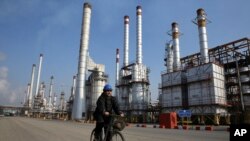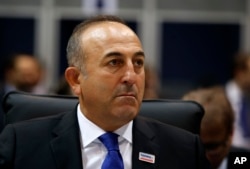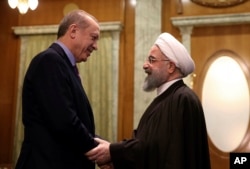Ankara has criticized Washington's hardline policy toward Tehran, and with Turkey's cooperation seen as vital to enforcing U.S. sanctions against Iran, analysts say a new confrontation could be looming.
"The implementation of sanctions against Iran will have a negative impact on the entire region and is extremely dangerous," Turkish Foreign Minister Mevlut Cavusoglu said in an interview Friday with Turkey's state news agency Anadolu.
A senior adviser to Turkish President Recep Tayyip Erdogan, speaking on condition of anonymity, said "Turkey will only enforce U.N. sanctions and no other. Turkey is not going to be used for other countries' agendas."
U.S. President Donald Trump earlier this year vowed to enforce tough economic sanctions against Tehran after withdrawing from an international agreement on Iran's nuclear program.
Analysts say that while Turkey and Iran are historically regional rivals, Ankara is wary of being sucked into any confrontation between Washington and Tehran.
"Turkey shares a border with Iran, it has had difficult relations with Iran over many centuries," said Sinan Ulgen, head of the Istanbul-based Edam think tank. "But at the same time, it knows it will continue to live side by side with Iran, and it recognizes the role of Iran in the region. Therefore, it does not want to take sides in a conflict between Iran and the U.S."
Turkish-Iranian relations often are characterized as an uneasy mix of cooperation and rivalry. Energy-poor Turkey relies on Iran's oil and is the largest importer of Iranian natural gas. But this week, the U.S. director of policy planning, Brian Hook, ruled out any "waivers of licenses" for any businesses doing business with Iran.
Analysts point out that Ankara has undermined previous U.S. Iranian sanctions. "Since the very beginning, they [Ankara] have profited a lot from sanctions, especially under the [former Iranian President] Ahmadinejad regime. Turkey was one of two or three countries that helped over avoiding sanctions," said Iran expert Jamshid Assadi of France's Burgundy Business School.
"But Turkey is more internationally isolated than it was in the past, and it may be ready to circumvent sanctions. I think it will be more difficult, it may think twice before defying Washington, they [Ankara] are not on good terms with Israel, and the European Union," Assadi added.
U.S. leverage
Washington retains powerful leverage over Ankara. U.S. authorities are considering potential multibillion-dollar fines against Turkish state banks after a New York court convicted a senior employee of Turkey's Halkbank for violating U.S.-Iranian sanctions.
"Given the already quite frail state of the Turkish economy, if the U.S. decides to impose heavy sanctions that would further endanger the health of the economy," analyst Ulgen warned.
The Halkbank case is one of multiple issues straining Turkish-U.S. relations. However, there has been progress over the past several months in resolving some disputes.
Turkey's location bordering Iraq, Iran and Syria makes it strategically important to Washington. "[A] crucial ally and partner," is how U.S. Assistant Secretary of State A. Wess Mitchell described Turkey in Senate hearings this week.
Turkish cabinet
Erdogan on Monday is due to announce his new cabinet, which will report directly to him under Turkey's new executive presidency.
International relations Professor Huseyin Bagci of Ankara's Middle East Technical University suggests a new approach could be in the offing. "Ibrahim Kalin is likely to be the new foreign minister, and if there is a new foreign minister, there is a new attitude in general to Russia, to America and the Europe Union. We may expect that Turkey will not be so confrontational, but rather cooperational in several fields."
Personal chemistry between the U.S. and Turkish presidents also could play a part in achieving a diplomatic breakthrough.
"Trump was one of the first to congratulate Erdogan on his victory. There may be personal chemistry between Erdogan and Trump to resolve their differences," Bagci said.






